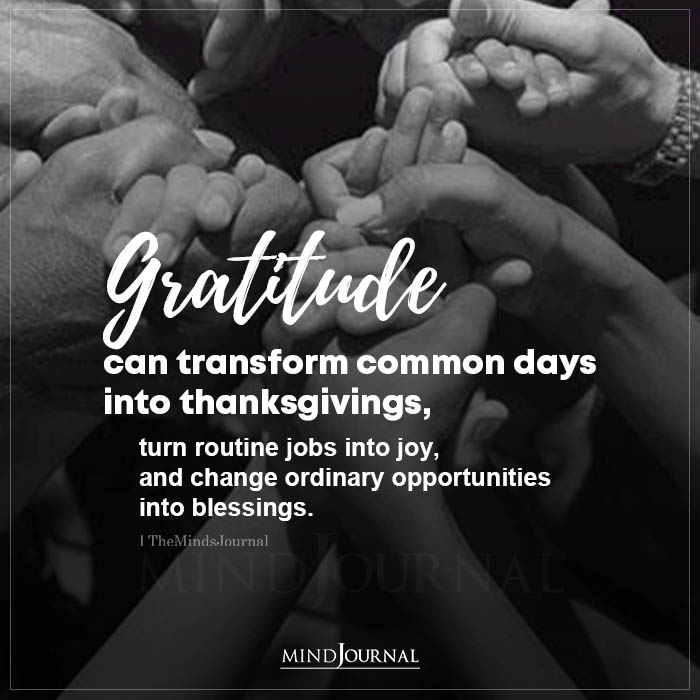You might feel an absence of gratitude from time to time due to life challenges. So here’s how to feel grateful when you don’t. The struggle is real!
The expectation of feeling grateful can be challenging when we’re struggling with loneliness or relationship, work or health problems. It can be even harder to have gratitude around holidays when we see other people happily celebrating.
When you’re discouraged or weighed down with negative thoughts, there are several things you can do.

Why is it hard to express gratitude?
Gratefulness comes more easily to some than others. Some of us have a habit of focusing on the negative. One reason for this is that we take what makes us comfortable for granted because our brains are predisposed to solve problems.
Negative thinking is also a defense to hope and feeling happy. We may have been conditioned that way in childhood or have suffered many losses or setbacks. We guard ourselves against happiness and hope so as not to be disappointed once again.
Related: The Importance Of Gratitude And Best Ways To Practice It
Religion – Thanksgiving and Gratitude
All world religions stress the importance of gratitude. In Judaism, prayers of gratefulness are an essential component of worship, which orthodox Jews recite one hundred times a day. Gratitude was referred to by Martin Luther as a “basic Christian attitude.”
The Quran states that the grateful will given more. Muslim believers are encouraged to give thanks five times a day. Sufi, Hindu, and Buddhist traditions also emphasize giving thanks.

Moreover, religion exhorts that we should be grateful notwithstanding our current problems and circumstances – not to deny them, but in addition and in spite of them. To feel gratitude only when we feel good is considered narrow-minded.
In the Bible, Paul teaches, “In everything give thanks.” The Hebrew Midrash instructs, “In pleasure or pain, give thanks!” Islamic tradition says that those who give thanks in every circumstance will be the first to enter paradise.
The purpose of prayer is to open us to the presence of God. When it’s heartfelt, it changes us. Prayers of gratitude affirm God’s presence in everything and potentiate infinite possibilities.
Why Be Grateful?
The mystic Meister Eckhart believed that thanking God was the most important prayer. Prophets and monks know that gratitude brings us closer to God. Even if we’re not religious, gratitude enables us to see our life in a larger context beyond our immediate troubles.

It expands our experience of life and counteracts an ego-centered contraction and preoccupation with losses, fears, and wants. Being grateful only when good things happen reinforces our ego’s demand that good things happen, setting up greater disappointment when things don’t turn out as we desire. This, according to Buddha, is the cause of suffering.
Related: 5 Ways Gratitude Improves Our Mental Health
The sages also knew that gratitude actually shifts our perspective from feeling depressed, envious, angry, or self-pity to a happier mood. It can open our hearts to joy and generosity because we begin to feel that we’re blessed.
Moreover, how we view our circumstances determines our ability to manage and overcome them. Often it’s worry or anxiety about the future or shame or guilt about ourselves that colors how we see a situation.
Negative beliefs and emotions limit our imagination and ability to cope and solve problems. Hence, our state of mind ultimately is more important than our outer experience.
“Nothing is either good or bad. It’s thinking that makes it so.” ~ Shakespeare
Cultivating an attitude of acceptance enables us to feel grateful even when we’re in pain. It’s helpful to view all experience is an opportunity to grow and learn. Wrote Helen Keller, “Everything has its wonders, even darkness and silence, and I learn whatever state I may be in, therein to be content.”
Rather than seeing ourselves as a victim of circumstance, acceptance of reality and developing gratitude for what we do have versus focusing on what we don’t empower us to take appropriate action.

With the advent of the positive psychology movement, gratitude was only recently subjected to empirical research. What religion has known for millennia, science has confirmed.
Numerous studies suggest that grateful people are more likely to have higher levels of happiness and a sense of well-being and lower levels of stress and depression. There’s also research that gratitude boosts the immune system. This naturally translates into better physical health.
Related: 3 Effects Of Gratitude On The Brain And Body, According To Science
How To Feel Grateful When You Don’t? Here Are 11 Ways To Be Thankful When Life Is Hard
There are specific steps you can take to actually develop a habit of being grateful and being more optimistic. Here are steps you can take:
- There’s wisdom in the phrase, “Count your blessings.” Listing the things for which you’re grateful can generate feelings of appreciation and gratitude. It’s often suggested to write them down on a daily basis. (See “5 Life Changing Habits.”) You can start with the fact that you have a brain, can write, and can read. Add small things, for example, seeing a child smile, receiving affection from a pet or greeting from a co-worker, or accomplishing a task, such as doing laundry or taking a walk. After several days, you’ll begin to look for things to add to your list and find that your mood significantly improves – faster than taking an anti-depressant.
- Read your list to someone. Sharing you grateful feelings doubles the effect. Arrange to regularly share you grateful lists and give thanks together. Praying together heightens your sense of connectedness and well-being.
- Go deep into silence. Relax, and stay mindful of the present moment, feeling your breath and body. Feel gratitude for the aliveness in your body.
- Express thanks daily. Doing so out loud has more power. In the morning and evening, and before meals, recite prayers of gratitude, or just say “Thank you (God) .”
- Thank others throughout the day for their help, particularly people you don’t ordinarily thank, such as cashiers. This is a recognition that you depend upon many people in order to survive and acknowledges your interdependent existence. The same is implicit in saying grace for the labor that goes into the food on your table.
- Compliment people. Giving compliments shows appreciation and lifts others’ moods and yours.
- Put notes on your refrigerator, mirrors, and computer to remind you to be thankful.
- Think about people you appreciate. The act of visualizing them with positive feelings opens your heart to gratitude.
- Write people unexpected thank you notes. Writing your appreciation prompts loving feelings that engender gratitude.
- Do small acts of generosity, such as giving someone your place in line, helping someone pay for a purchase, or bringing food to a neighbor.
- Thank yourself at the end of the day for things you did well. List at least three things. They may be small and include the above acts of gratitude.
Try focusing on just one of these suggestions for a week at a time before incorporating more. Eventually, you’ll notice a change in your mood until your “cup runneth over” – or, at least appear half full rather than half empty.
©Darlene Lancer 2012
Related: How The Universal Law Of Gratitude Can Help You
It is tough to feel grateful, sometimes, like having a difficult relationship with your family or partner. When you experience difficult feelings, make sure to practice the ways to be grateful. And don’t forget to share your thoughts in the comments below!
Till then have a Happy Thanksgiving day 2023!
Written by Darlene Lancer JD, MFT Originally Published on WhatIsCodependency.com










Leave a Reply
You must be logged in to post a comment.